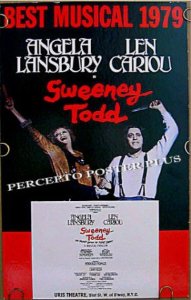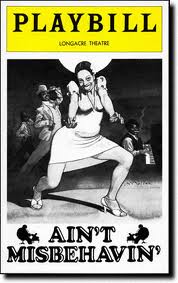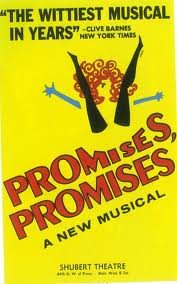
From Broadway To 52nd Street…
Evita opened at the Broadway Theatre on September 25, 1979 and ran 1,567 performances. The musical starred Patti Lupone, Mandy Patinkin, Bob Gunton, Mark Syers, Jane Ohringer singing music composed by Andrew Lloyd Webber with lyrics by Tim Rice. The show began as a rock opera concept album released in 1976. Its success led to productions in London’s West End in 1978, and on Broadway a year later, both of which enjoyed considerable success. A major 1996 film of the musical was made, starring Madonna and Antonio Banderas. The musical was revived in London in 2006. Evita has had numerous professional tours and worldwide productions, and numerous cast albums have been recorded, and won a 1980 Grammy. “Don’t Cry For Me Argentina” has become an entry into the catalogue of jazz standards.
The Story: Evita is a musical that concentrates on the life of Argentine political leader Eva Peron, the second wife of Argentinian President Juan Peron. The story follows Evita’s early life, rise to power, charity work, and eventual death.
Broadway History: The Booth Theatre was given its name in recognition of one of the great contributors to American theatre. However, the current Booth Theatre does not get its name from an accomplished actor, playwright, or producer. It comes instead from the original Booth Theatre, which was originally located on 23rd Street and 6th Avenue. The original Booth Theatre, which opened on February 3, 1869 with a production of Romeo and Juliet, derived its name from Edwin Booth, an accomplished Shakespearean actor, who unfortunately happens to be the brother of infamous actor/assassin John Wilkes Booth. Although demolished only fourteen years later in 1883, the theatre revolutionized American drama by incorporating hydraulic ramps to change scenery, an electric device that allowed changes in lighting, and a sprinkler system. Fun fact, the top floor of the original theatre’s adjoining shop and rehearsal space was reserved as Edwin’s personal apartment.
Sponsored By
www.whatissuitetabu.com

From Broadway To 52nd Street
Sweeney Todd opened at the Uris Theatre on March 1, 1979 and ran for 557 performances. The musical starred Angela Landsbury and Len Cariou with music composed by Stephen Sondheim from which came the song Pretty Women that entered into the jazz pantheon. The show would also win Best Musical for that year.
The Story: The Demon Barber of Fleet Street was set in the 19th century London. Todd is a barber who dispatches his victims by pulling a lever as they sit in his barber chair. Todd “polishes them off”, slitting their throats with his straight razor before dispatching them into the basement via the revolving trapdoor. After Todd has robbed his dead victims of their goods, Mrs. Lovett, his partner in crime assists him in disposing of the bodies by baking their flesh into meat pies and selling them to the unsuspecting customers of her pie shop. Todd’s barbershop is situated at 186 Fleet Street and is connected to Mrs. Lovett’s pie shop by means of an underground passage.
Jazz History: The end of the 70s decade saw trumpet virtuoso Wynton Marsalis in New York and a hard bop revival was soon underway. Bassist and composer Charles Mingus dies in Mexico at the age of 56. Vocalese singer Eddie Jefferson dies on May 9 in Detroit, Michigan. A jam session at the Brecker brothers’ club will produce the group Steps Ahead. Gil Scott Heron is experimenting with a new form of music which involves spoken poetry set to music, similar to what will later be known as hip hop and rap; the first Sony Walkman (model TPS-L2) hits the market and two years later the word “Walkman” enters the dictionary, and the product changes listening habits forever.
Sponsored By
www.whatissuitetabu.com

From Broadway To 52nd Street
Ain’t Misbehavin’ opened at the Longacre Theatre on May 8, 1978 and ran for 1604 performances, establishing it as one of the blockbuster musicals of Broadway. Thomas “Fats” Waller who left an indelible imprint on the music by the time of his death at age 41 composed the music that included jazz favorites “Ain’t Misbehavin”, “Honeysuckle Rose” and “I’m Gonna Sit Right Down And Right Myself A Letter”. Richard Maltby directed Nell Carter, Andre Deshields, Armelia Mcqueen and Ken Page.
The Story: Began performance at the Manhattan Theatre Club, this musical retrospective of the life of Fats Waller, master of the stride piano, comedian, last of the great Black minstrel showmen, uses his songs written with various lyrics. In spirit, Ain’t Misbehavin’ evokes the late days of Prohibition when “vipers” smoked “reefers” and bootleg booze could be the worst or the best depending on the source of supply. Title song first sung in the 1929 revue “Hot Chocolates”. The musical won a Grammy in 1978 for Best Cast Show Album.
Broadway History: By the Seventies Broadway is a disheveled cornucopia of porn shows, strip clubs, drug dealers, pimps, prostitutes, runaways, hustlers and street people. The American Musical was not dissuaded by this environment as it morphed into a cultural consciousness during the Seventies to become an instrument of social commentary bringing plays with mixed casts like Hair, Jesus Christ Superstar, Godspell, Two Gentlemen From Verona and the longest running play on the avenue A Chorus Line. Though the country was still reeling from Vietnam, plays like Company gave audiences an opportunity to view middle-class morality and their problems. Black audiences got to see shows like Bubbling Brown Sugar, Timbuktu, Eubie and Purlie opening up the stage for more Black actors and musicals to shine on the Great White Way.
Sponsored By
www.whatissuitetabu.com

From Broadway To 52nd Street
A Little Night Music brings up the curtain of the Shubert Theatre on February 2, 1973. Stephen Sondheim composed the music that spawned the jazz classic Send In The Clowns. Glynis Johns, Len Cariou, Victoria Mallory, Laurence Guittard, Hermione Gingold and Mark Lambert. Though it only ran for 600 performances it went on to get a movie made in 1978, directed by Harold Prince and starring Elizabeth Taylor, Lesley-Anne Down and Diana Rigg.
The Story: Based on the Ingmar Bergman comedy about sexual liaisons at a country mansion. Frederick falls in love with his former mistress Desiree’ and would dissolve his marriage to his child bride. Count Carl, Desiree’s lover, attempts to cool the romance. However at a dinner party given by Desiree’s mother, Frederick’s son, Henrik, runs off with his young mother-in-law, the Count returns to his wife and Frederick and Desiree’ are free to pursue their romance.
Jazz History: It’s the 1970s and jazz is in an evolutionary mode as the old guard makes way for a new sound. The jazz world has witnessed the release of fusion albums from Weather Report, Chick Corea and Return To Forever and the Mahavishnu Orchestra. Herbie Hancock records the classic jazz/funk album Head Hunters that includes “Chameleon” and “Watermelon Man” as does drummer Billy Cobham with his recording “Spectrum” with Tony Bolin, Jan Hammer, Lee Sklar, Joe Farrell, Jimmy Owens, John Tropea, Ron Carter and Ray Barretto. In 1973 swing and bop saxophonist Ben Webster passes away on September 20th as does stride piano pioneer Willie “The Lion” Smith on October 8th. Fortunately for the many young men who haven’t been called upon, the United States is almost completely out of Vietnam.
Sponsored By
www.whatissuitetabu.com

From Broadway To 52nd Street
Promises, Promises opened at the Shubert Theatre on December 1, 1968 and ran for 1281 performances, ushering it into the blockbuster hall of fame. Composers Burt Bachrach & Hal David scored the music that rendered I’ll Never Fall In Love Again that went on to become a jazz standard. Jerry Orbach, Ken Howard and Jill O’hara star.
The Story: In this adaptation of the Jack Lemmon movie vehicle “The Apartment”, a young man (Jerry Orbach) attempts to get ahead in the world of business, climbing the corporate ladder by lending his apartment to various executives.
Broadway History: A reluctant success of Broadway is the fact that many of the plays had been turned into movies by the Hollywood film industry. When the movie studios began implementing sound technology for film screenings, musicals were some of the first productions released on the silver screen. Not only did the scripts migrate from the stage to the screen, but many actors and actresses did as well. To this day, many well-known film actors began their career on Broadway.
Sponsored By
www.whatissuitetabu.com


